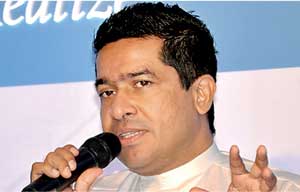Tuesday Feb 17, 2026
Tuesday Feb 17, 2026
Tuesday, 19 September 2017 00:39 - - {{hitsCtrl.values.hits}}
By Charumini de Silva
The Ministry of Development Strategies and International Trade will conduct a consultative meeting with its line ministries today at Temple Trees to finalise the National Export Strategy (NES) to chart the next export growth cycle of the country.“We have now come to the final stages of implementing the NES. At the meeting today we will focus on the proposals of our line ministries, which will be added to the upcoming 2018 Budget proposal,” International Trade State Minister Sujeewa Senasinghe told the Daily FT.
The five-year NES lays emphasis on the diversification of exports through the strengthening of emerging sectors. Bearing in mind different growth trends, the NES focus sectors are ICT, wellness tourism, spice concentrates, boat building, processed food and beverages, and electronic and electrical machinery.
The development of this strategy is a central component of the ‘EU-Sri Lanka Trade-Related Assistance: Increasing SMEs’ trade competitiveness in regional and EU markets’ project, implemented by the International Trade Centre (ITC) and funded by the European Union (EU).
It was pointed out that the focus sectors were identified based on quantitative and qualitative parameters derived from export potential assessments, conducted by the Export Development Board (EDB) and the Board of Investment (BOI) under the guidance of Harvard University, and further sector analysis by the Commonwealth Secretariat, McKinsey Co., the ITC and the World Bank.
Senasinghe said the NES is expected to be finalised by December for it to be implemented from next year.
“With the completion of the strategy by the end of this year, the NES will serve as a roadmap to increase exports and value creation while linking our economy into global value chains, to ensure sustainable development with greater prosperity for the people of Sri Lanka,” he added.
In addition, the NES will ensure that all export sectors including mature sectors such as tea, apparel and rubber will benefit from the strengthening of trade support functions.
Through wide public-private consultations, trade support functions (TSF) were shortlisted to achieve the NES vision and strategic objectives of national quality infrastructure, innovation and R&D and logistics. These trade support functions will aim at improving the overall competitiveness of Sri Lanka’s export sector.
EDB Chairperson Indira Malwatte highlighted that the significance of developing a strategic vision for export development pointing out the steady advancement of worldwide market demands for more specialised products, evolving supply conditions and the emergence of modern technology.
“The Government has embarked on developing and promoting exports of the country giving it the highest priority, to increase and consolidate foreign exchange earnings, which will create new employment, build skills, capacities and attract export-driven investments,” she added.
Malwatte said the NES has placed specific focus on ensuring the priorities are implemented rapidly by the relevant public and private institutions at the sector and regional levels and in close coordination with development partners.
Following the consultative meetings in April and July, she said the EDB has now commenced regional discussions in Kandy, Jaffna and Galle where national public and private sector representatives will confirm the strategic interventions that the NES should focus on for the next five years. The EDB Chief believes the NES initiative will support Sri Lanka’s economic vision, which will result in enhanced social benefits and improved lifestyles for all Sri Lankans.